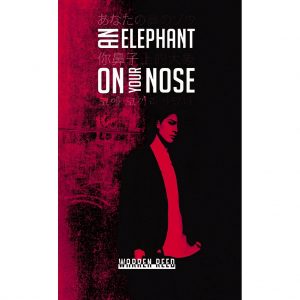An Elephant On Your Nose: Book Review
Former Australian Secret Intelligence Service (ASIS) operative Warren Reed’s latest novel An Elephant on Your Nose is both an encaptivating “spy” story set in Japan, and an enlightening commentary about new regional security realities.
The plot of the story is about an MI6 operative Isabella Di Stefano Butterfield, called Bella throughout the novel, who has been sent to Tokyo to discuss the building of a modern Japanese spy agency along the lines of MI6 before the 2020 Olympic Games. However, before discussions could take place, information on an Islamic-State inspired terror attack, on a 911 scale came to light with intelligence information suppliedsurprisingly by the Chinese.

In the background Reed had set for his novel, Japan had been immune from terror attacks until two Japanese aid workers were kidnapped and beheaded by ISIS terrorists in Syria. Now a terror cell was transporting a suitcase sized nuclear bomb by fishing boat from Korea to Japan with the intention to blow up the Japanese Diet or parliament, which would kill many thousands of people in central Tokyo. A multi-national team made up of Japanese and Korean operatives, Bella from MI6, and Li Weiming from the Chinese Security Service began work to counter the threat, which unfolds step by step.
The scenes Reed paints in the novel are primarily based in operations rooms. The assembled team concerned themselveswith uncovering clues and interpreting incoming information from a variety of sources to find, keep under surveillance, apprehend, and interrogate the terrorists. For this they went on without much sleep working around the clock.
The multi-national group was comprised of individuals who weren’t natural allies. Thus, the operatives often hedgedsuspicions about each other. As the story unfolds, side issues and hidden agendas emerge.
This is why the old Malay proverb An Elephant on Your Nose is apt as the title which means someone can see a louse as far away as China but is unaware of the elephant on his or her nose. The operatives could see events far away unfolding, but unaware of the realities behind these events that were happening right around them in their own operations room.
The novel concludes with Bella finding out from one of the technicians who overheard a conversation in the operation room toilets that the nuclear bomb was actually a dud supplied to the terrorists by the Chinese. Finally, it was revealed that a number of Japanese working in the team had compromising loyalties to an unidentified foreign power.
This is not a novel about saving the world. Its more a window into a world where the various players are looking after certain sets of interests. Behind a bridge of trust built up during the operation is an entanglement of deceptions, inter-nationalist rivalries, and interpersonal suspicions. This brings them into conflict with their co-workers, some of which they consider friends. The operatives’ sense of ethics are regularly challenged as events play out. The novel shows how this is all delicately handled by the individuals involved.
An Elephant on Your Nose is a novel that is difficult to put down once you start reading. Reed has made the operations room scenes just as interesting as any James Bond style action scenewith all the physical antics and modern gadgetry. Only here the action is cerebral, working out the realities of what is laid before the players. There is no right or wrong, or no goodies or baddies in the novel. Just shades of complexity which Reed has left us to think about.
For example, the Chinese gave Japan intelligence information which assisted the Japanese intelligence group foil a massive terrorist plot. However, at the same time, the Chinese had supplied the terrorists a dud nuclear suitcase bomb. This information was concealed from the Japanese authorities on purpose. What made the whole situation even more intriguing was that the Chinese were floating the idea of a tripartite-agreement on technology development between China, Japan and Korea at the same time. Reed doesn’t tell us the Chinese motive behind the deception. There are multiple perspectives and conclusions that can be made. Once again, Reed has left that up to the reader to think about.
At another level within the story Reed conceptualizes a number of contemporary issues by way of fable. With the cold war long over, new threats to national security from non-state entities are replacing the traditional state to state focus of the intelligence world.
The change in focus is forcing the forging of new working alliances and cooperation. Reed also covers the area of China compromising top government officials and politicians, something extremely relevant to Australia. Reed discusses all the new surveillance technology. Here Chinese expertise is coming to the fore. Reed touches on the issue of ISIS fighters returning home and the potential consequences.
With Reed’s descriptions of technical operations throughout the novel, he indirectly informs the reader that not everything done within the intelligence world is within the law. Reed leaves it to the reader to speculate on the morality of this when such operations potentially prevent mega-disasters such as terrorism’s worst nightmare, a nuclear attack. There is no moralizing in this novel.
Reed makes a subliminal point about declining US influence in East Asia. The whole story is about the rising cooperation between East Asian states with the exclusion of the United States.
The message for Australia is that Beijing is closer to us than Washington and has much more relevancy to our daily lives. The Chinese re-emergence is vastly different than the rise of the US. China is able to spread its influence across the region without the need to show military supremacy. China’s prime strategies to garner influence are non-military.
If I had to make any criticism about the book, perhaps the author could have elaborated a little more on the major players when each character came into the story. However, this may have disrupted the momentum Reed had going in his narrative. The letter from Bella to Li at the end of the book went a long way in retrospectively filling in these gaps. However, it also served to show that the main players were actually lonely people who paid for their professional success with unfulfilled personal lives.
Probably the main theme of Reed’s book was about the need for cooperation at two levels. Firstly, cooperation between people with different disciplinary backgrounds, from different walks of life. This brings a synergy in making deductions from clues when seen from different perspectives. Secondly, cooperation between different agencies at the inter-organizational levelallows for the pooling of both intelligence and analytical resources to detect terrorist cells which operate across national borders.
Reed believes that in today’s technology rich environment,human judgements, most often made under stress and pressure is what matters. This is particularly important when agencies in the future will face more and more unprecedented incidents.
Hard work, dedication, and personal sacrifice are the most important personal qualities an intelligence operative requires. This is probably introspective of Reed.
Finally, Reed tells us that to understand the big picture, we must understand history. Today’s events come out of history. History to some extent influences particular actions and behaviour. Good analysis demands understanding the stories behind the story.
An Elephant on Your Nose goes further than presenting an entertaining narrative, its also a commentary about new realties, done in fable form, which Reed is a master.
A complex plot with lots of twists, yet easy and very enjoyable to read.

